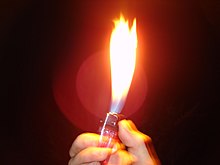Power ballad
This article possibly contains original research. (September 2007) |
This article contains weasel words: vague phrasing that often accompanies biased or unverifiable information. |

The term "power ballad" is a colloquialism used to describe a type of song performed (but not necessarily written) by a hard rock or heavy metal band that is atypical of the songs defined by the hard rock and heavy metal genres. Typically, a power ballad is characterized by having a slower meter, longer voiced notes, acoustic guitars in place of electric guitars, and deemphasized percussion and bass; but some sections of the song may include strong percussion and bass that are more typical of the hard rock and heavy metal genres for increased emotional effect. Common power ballad themes include (but are not limited to) emotional heartache, need, love and loss.
In some cases, the power ballad may become the hard rock or heavy metal band's signature song.
History
It is believed (but not necessarily documented) that power ballads first came into existence in the 1970's at the insistence of record company executives who may have coerced their signed hard rock and heavy metal bands to include a powerful ballad on an album based upon the possibility that the power ballad would attract a larger listening audience than the band's typical music. The potentially larger listening audience could then lead increased album sales. This belief is evidenced by the number of power ballads (and their albums) that achieved Top Forty status over the hard rock or heavy metal band's more typical music.
A possible precursor for the power ballad form was The Carpenters' Goodbye to Love single in 1972, which featured a fuzz-tone screaming guitar solo (by Tony Peluso) situated next to a "middle of the road" vocal.[3]
Examples
Examples of songs that could be classified as power ballads include the following:
- "Don't Wanna Say Goodbye" from the Raspberries' 1972 debut album The Raspberries
- "Lady" from Styx's 1973 album Styx II
- "I'm in Love with My Car" from Queen's 1975 album A Night at the Opera
- "Burning Heart" by Vandenberg from 1982
- "Still Loving You" by The Scorpions from 1984
- "Sister Christian" by Night Ranger from 1984[4][5], as did Dokken's "Alone Again" in 1985.[6]
- "Home Sweet Home" by Mötley Crüe, released in 1985 on the Theatre of Pain album[7]
- "I'll Be There for You" by Bon Jovi
- "Don't Know What You Got (Till It's Gone)" by Cinderella
- "Love Bites" by Def Leppard
- "Every Rose Has Its Thorn" by Poison
- "Heaven" by Warrant
Power Ballad Compilations
Some power ballad songs by various groups have been included on compilation albums. These include the following:
See also
References
- ^ "POP VIEW; The Male Rock Anthem: Going All to Pieces". The New York Times. Published February 1, 1998.
- ^ "Rock Concert Question: Are Lighter Salutes Bad for the Environment?" Live Science. Published July 15, 2006.
- ^ "Popular Musicians" by Steve Hochman/Mcrea Adams page 168 Book
- ^ "Billboard.com - Artist Chart History - Scorpions". Retrieved 2006-12-21.
- ^ "Billboard.com - Artist Chart History - Night Ranger". Retrieved 2006-12-21.
- ^ "Billboard.com - Artist Chart History - Dokken". Retrieved 2006-12-21.
- ^ "Mötley Crüe - Biography - MTV.com". Retrieved 2006-12-21.
